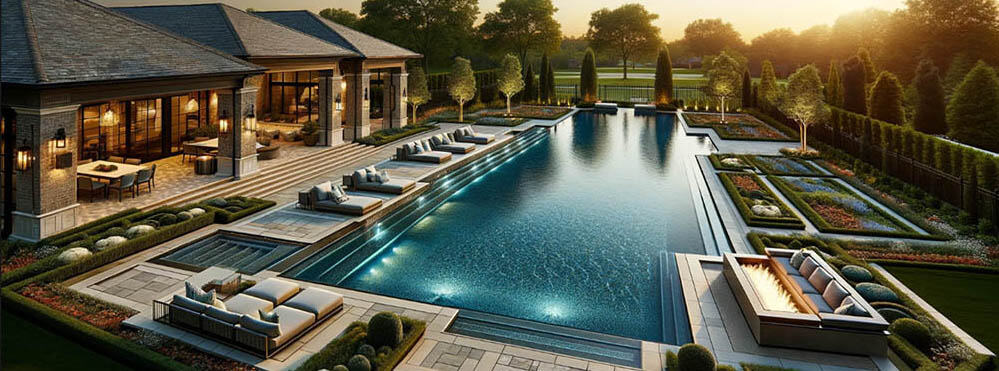
20 Types of Pools
Deciding on the perfect pool can feel like navigating through murky waters, with considerations like budget, space, and maintenance needs making the choice all the more challenging.
Really, are there 20 types of pools out there? How do you decide which type will fit your needs and constraints?
Deciding on the perfect pool can feel like navigating through murky waters, with considerations like budget, space, and maintenance needs making the choice all the more challenging. Don’t worry, we’ve got your back! In this article, we’ll dive into the different types of pools, from the sleek and modern infinity pools to the practical and budget-friendly above-ground options, and everything in between.
There are two main categories of pools:
- Above Ground Pools and
- In-ground Pools.
Above-ground and in-ground pools can also be considered as two overarching types of pools, each encompassing a variety of other specific types within them. This classification is based on their foundational construction differences — whether the pool is built above the ground level or excavated and constructed within the ground.
Above-Ground Pools: Generally less expensive and easier to install than in-ground pools, above-ground pools are a great option for those on a budget or with limited space. They come in various shapes and sizes and can be made from metal frames with liner, metal body with liner, resin, or even wood.
Read more about Above Ground Pools here.
In-Ground Pools: In-ground pools offer a more permanent and luxurious swimming experience. They can be customized to any size, shape, and depth, and can be made from a variety of materials, including concrete, fiberglass, and vinyl. Read more about In-ground Pools here.
Below is a comparison table that outlines the key differences between in-ground pools and above-ground pools across various factors:
| Factor | In-Ground Pools | Above-Ground Pools |
| Construction | Permanent structure, requiring excavation and construction on-site. | Portable, constructed above ground without the need for excavation. |
| Materials | Concrete, vinyl liner, fiberglass. | Metal frame, resin frame, inflatable (with vinyl or PVC liner). |
| Customization | Highly customizable in shape, size, and depth. | Limited customization, mostly available in predetermined shapes and sizes. |
| Durability | Generally more durable, designed to last many years with proper maintenance. | Less durable than in-ground pools, with a shorter expected lifespan. |
| Installation Time | Longer installation time, often several weeks to months. | Quicker installation, ranging from a few hours to a few days. |
| Cost | Higher initial cost due to extensive construction and materials. Ongoing maintenance costs can also be higher. | More affordable in terms of initial investment and maintenance costs. |
| Aesthetics | Can be integrated seamlessly into landscaping, enhancing property value. | Less likely to add to property value, often seen as a temporary structure. |
| Lifespan | Can last 20 years to a lifetime, depending on materials and maintenance. | Typically lasts between 1 to 15 years, depending on the quality and maintenance. |
| Maintenance | Requires regular maintenance, which can be more involved and costly. | Generally easier and less costly to maintain, but still requires attention. |
| Mobility | Fixed location, not meant to be moved once installed. | Some models can be disassembled and moved, offering more flexibility. |
Exploring the Different Types of Pools
Contents
- 1 Exploring the Different Types of Pools
- 2 The Benefits of Choosing an Above Ground Pool for Your Yard
- 3 The Benefits of Choosing an In Ground Pool for Your Home
- 4 Benefits of Fiberglass Pools
- 5 Benefits of Lap Pools
- 6 Benefits of Swim Spas
- 7 Benefits of Hot Tubs and Spas
- 8 Pros and Cons of Different Pool Types
- 9 Pool Selection: Factors to Consider for Your Home
- 10 Final Thoughts
There are in-ground pools that can fit any backyard dream. And there are above-ground pools that are easy to set up and move around. Each kind has its own cool features.
There are also special pools like infinity pools that look like they go on forever. Lap pools are great for swimming fast without turning around. And natural pools are like swimming in a pond but cleaner. Finding the right pool is all about what you like and what fits in your space.
Beyond these types, explore specialty pools like lap pools for dedicated swimmers, or plunge pools for a refreshing dip in a compact space. With a little research, you’ll find the perfect pool to suit your needs and create a backyard retreat you’ll love.
Here’s a splash of the different types of pools you might consider for your oasis:
- Above-Ground Pools: These are cost-effective and can be set up quickly. They’re portable and can be a great option if you’re not ready to commit to a permanent structure in your backyard.
- In-Ground Pools: Offering a more permanent solution, in-ground pools can be designed in various shapes and sizes and are built to last.
- Fiberglass Pools: Known for their smooth surface and quick installation, fiberglass pools are molded off-site and installed in one piece.
- Concrete Pools: Highly durable and customizable, concrete pools can be formed to any shape or depth, making them perfect for a truly unique backyard feature.
- Vinyl-Liner Pools: These pools have a custom-made sheet of vinyl between the water and the pool structure. Vinyl liners are versatile in terms of design but need to be replaced every 4 to 9 years.
- Infinity Pools: Also known as vanishing edge pools, they create a visual effect of water extending to the horizon. They are especially stunning when overlooking scenic views.
- Lap Pools: Designed for fitness and health, these long and narrow pools are perfect for swimming laps and can fit in more constrained spaces.
- Swim Spas: Combining the features of a swimming pool with a spa, these pools are great for relaxation and exercise, allowing for swimming against a current.
- Hot Tubs and Spas: While not pools in the traditional sense, they complement the pool experience by offering relaxation and hydrotherapy benefits.
- Architectural Pools: These pools are designed with a specific architectural style in mind, complementing the design of the house and landscape.
- Natural Pools: Also known as swimming ponds, these pools use plants and natural filtering processes to clean the water, offering an eco-friendly option.
- Saltwater Pools: These pools use a saltwater chlorinator to convert salt into chlorine, reducing the need for added chemicals and offering a softer feel on the skin.
- Plunge Pools: Small, deep pools designed for cooling off rather than swimming, perfect for smaller spaces or alongside a larger pool.
- Spools: A combination of a spa and a pool, these are larger than a spa but smaller than a standard pool, ideal for relaxation and light exercise.
- Indoor Pools: Built inside a house or a building, these pools offer year-round swimming regardless of the weather outside.
- Roof-top Pools: Roof-top pools are a dazzling escape, perched high above the ground. They blend the luxury of private swimming with stunning views, often found in urban settings or on top of hotels and residential buildings.
- Kiddie Pools: Shallow pools designed for young children to play safely under supervision.
- Olympic-Size Pools: These pools meet the international standards for competitive swimming and are used for training and competition.
- Ice Swimming Pools: Designed for the brave at heart, these pools are specifically for ice swimming. Found in colder regions, they offer a chilling dip that’s believed to have health benefits.
- Deep Diving Pools: Crafted specifically for diving enthusiasts and those looking to practice or learn diving techniques. They’re much deeper than standard swimming pools, allowing for safe diving from platforms or springboards of various heights.
These are some of the types of pools that you can explore. There are also other types, such as indoor pools, heated pools, and more. Each type of pool has its own advantages and disadvantages, and you should consider your needs, preferences, budget, and space before making a decision. I hope this information helps you find the best pool for you.
The Benefits of Choosing an Above Ground Pool for Your Yard
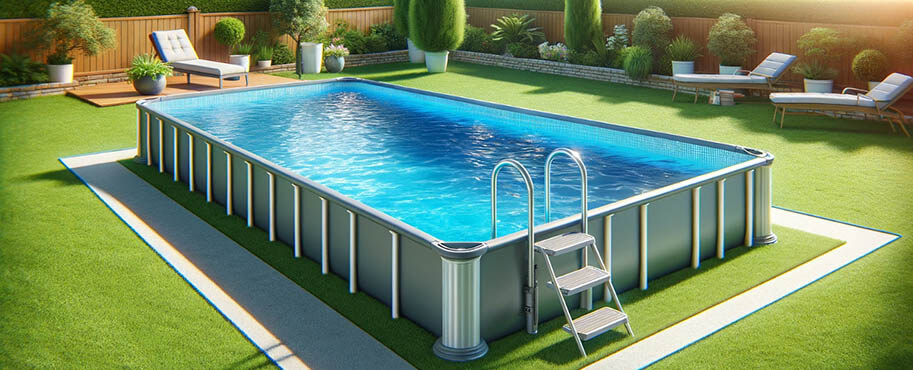
If you are looking for a way to enjoy the summer heat without breaking the bank, an above ground pool might be the perfect option for you. Above-ground pools are easy to install, maintain, and remove, and they come in a variety of shapes, sizes, and styles to suit your preferences and space. You can also add a deck or a patio around your pool to create a cozy and inviting outdoor area for your family and friends.
Another benefit of choosing an above-ground pool is that it is safer and more secure than an in-ground pool. Above-ground pools are less likely to attract unwanted visitors, such as animals, insects, or children, and they are easier to monitor and fence off.
These pools offer a budget-friendly alternative to in-ground options, making them ideal for families looking for a cost-effective way to add a touch of luxury to their outdoor space.
You can also avoid the risks of digging, plumbing, and electrical work that come with in-ground pools, and save money on insurance and taxes. With an above-ground pool, you can have peace of mind and fun at the same time.
The Benefits of Choosing an In Ground Pool for Your Home

One of the benefits of choosing an in-ground pool for your home is that it can enhance the beauty and value of your property. In-ground pools can be customized to fit your vision and style, whether you want a classic rectangular shape, a free-form design, or a unique feature like a waterfall or a spa. You can also choose from different materials and colors to create a pool that matches your home and landscape.
Another benefit of choosing an in-ground pool for your home is that it can provide you with more enjoyment and comfort than an above-ground pool. In-ground pools are deeper and larger, which means you can swim, dive, play, or relax in them.
They are also more stable and durable, which means they can withstand harsh weather and last longer. With an in-ground pool, you can have a personal oasis in your backyard that you can enjoy for years to come.
Beyond aesthetics, in-ground pools offer a lasting investment. They typically boast a longer lifespan than above-ground options, potentially increasing your home’s value and curb appeal. An in-ground pool becomes an extension of your living space, creating a resort-like atmosphere you can enjoy for years to come.
Let’s explore the benefits of a few other types of in ground pools.
Benefits of Fiberglass Pools
Fiberglass pools are a popular choice for homeowners who want a durable, low-maintenance, and customizable pool. Fiberglass pools are made from a single piece of molded fiberglass that is shipped to your backyard and installed in a matter of days. Unlike concrete or vinyl liner pools, fiberglass pools are resistant to cracking, leaking, algae growth, and chemical damage. They also have a smooth and non-porous surface that feels comfortable and reduces the need for scrubbing and cleaning.
Fiberglass’s inherent strength also makes it ideal for withstanding weather fluctuations and even minor ground movement, ensuring your pool provides lasting enjoyment for years to come.
Another benefit of fiberglass pools is that they are energy-efficient and environmentally friendly. Fiberglass pools have better insulation than other pool types, which means they retain heat better and reduce the cost of heating.
The non-porous surface discourages algae growth, minimizing the need for harsh chemicals and keeping your pool sparkling clean with minimal effort.
They also use less water and chemicals, which means they have a lower impact on the environment and your wallet. Fiberglass pools can also be customized to fit your vision and style, with various shapes, sizes, colors, and features to choose from.
Not So Beneficial
While known for durability, fiberglass pools come with a hefty price tag upfront compared to other options. Additionally, their prefabricated nature limits customization possibilities to the manufacturer’s mold designs.
Benefits of Infinity Pools
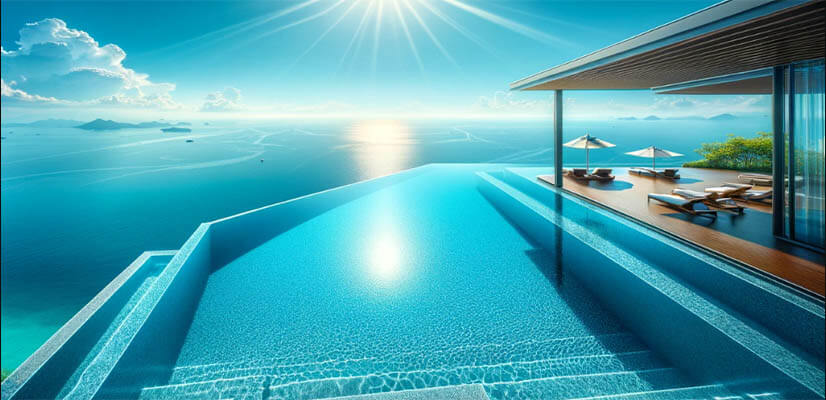
One of the benefits of infinity pools is that they create a stunning visual effect of water without boundaries. By allowing the water to flow over one or more edges, infinity pools can blend seamlessly with the surrounding landscape, such as the ocean, the sky, or the mountains. This can enhance the sense of space and openness, as well as the aesthetic beauty and luxury of the pool area.
Another benefit of infinity pools is that they are more environmentally friendly and energy-efficient than conventional pools. Infinity pools use a filtration system that constantly circulates and cleans the water, preventing stagnation and algae growth. This reduces the need for chemicals and maintenance. Infinity pools also have better insulation than other pool types, which means they retain heat better and reduce the cost of heating. They also use less water, as the water that overflows the edge is collected and recycled back into the main pool.
Not So Beneficial
However, infinity pools also have some drawbacks that you should consider before installing one. The main drawback is the cost of building and maintaining an infinity pool. Infinity pools require more construction work, materials, and equipment than standard pools, as they need a lower pool or a catch basin to collect the overflowing water, as well as a powerful pump system to circulate the water back to the main pool. This can make infinity pools very expensive and complex to build, and they may not be suitable for all climates or locations.
Another drawback of infinity pools is the safety hazard they pose, especially for young children and pets. The water cascading over the edge of the pool can create a strong current that can pull swimmers or animals into the pool. The edge of the pool can also be hard to see or access, which can make it difficult to rescue someone who falls into the pool. Infinity pools should be fenced off and monitored at all times to prevent accidents and injuries.
Benefits of Lap Pools
Lap pools are a great option for people who want to swim for fitness and health purposes. Lap pools are long, narrow, and rectangular, and they are designed to allow swimmers to practice laps without interruption. Lap pools can improve cardiovascular and muscular endurance, burn calories, reduce stress, and strengthen almost all human systems. Lap pools can also fit in narrow or shallow backyards, and they can be customized with heat or a resistance current.
Another benefit of lap pools is that they are low-maintenance and cost-effective compared to traditional pools. Lap pools have fewer features and decorations, which means they require less cleaning and upkeep. Lap pools also use less water and chemicals, which means they have a lower impact on the environment and your wallet. Lap pools can also be installed in concrete, vinyl, or acrylic sheets, depending on your preference and budget.
Not So Beneficial
However, lap pools also have some drawbacks that you should consider before installing them. The main drawback is the lack of versatility and fun that lap pools offer. Lap pools are not suitable for family recreation and relaxation, as they lack a shallow end, a wide set of steps, or a diving board. Lap pools are also uniform in depth, which may not be comfortable or safe for some swimmers. Lap pools may also not fit well with the style or architecture of some houses or neighborhoods.
Benefits of Swim Spas
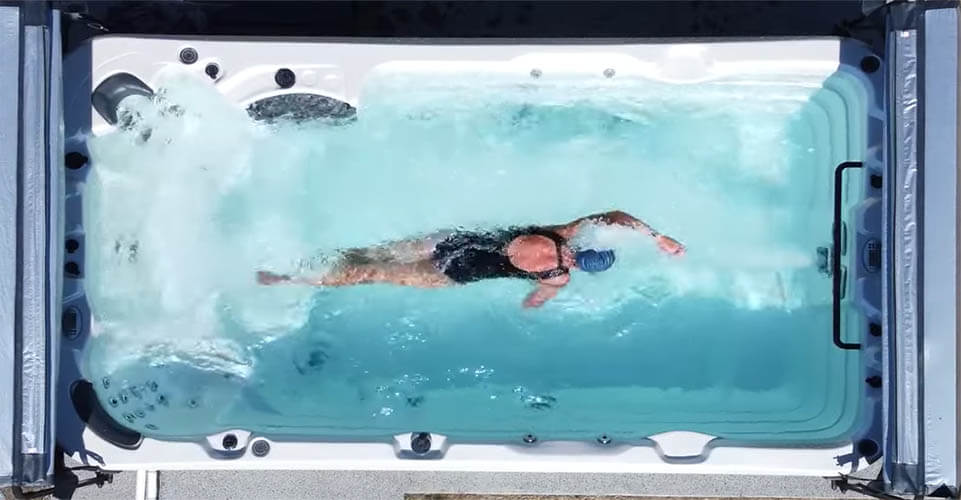
Your All-in-One Fitness and Wellness Oasis.
Swim spas are a combination of a swimming pool and a hot tub, offering both fitness and relaxation benefits. You can swim against a current of water that can be adjusted to your desired speed and intensity, or you can enjoy the soothing jets and massage features of the spa. Swim spas are ideal for people who want to exercise and unwind in the comfort of their own homes, without the need for a large space or a high budget.
Another benefit of swim spas is that they are versatile and adaptable to different needs and preferences. You can use them for various types of aquatic exercises, such as swimming, water aerobics, resistance training, or yoga. You can also customize them with different features and accessories, such as lights, speakers, covers, or steps. Swim spas can also be used all year round, as they have a built-in heating system that keeps the water warm even in cold weather.
Not So Beneficial
However, swim spas also have some drawbacks that you should consider before buying one. The main drawback is the high initial investment and the ongoing maintenance costs. Swim spas are cheaper than traditional pools, but they are still expensive to install and operate. They also require regular cleaning and balancing of the water, as well as periodic repairs and replacements of parts. Swim spas also consume a lot of electricity, which can increase your energy bills.
The footprint of a swim spa, while smaller than a pool, is still significant. They may not be suitable for very tiny backyards.
Benefits of Hot Tubs and Spas
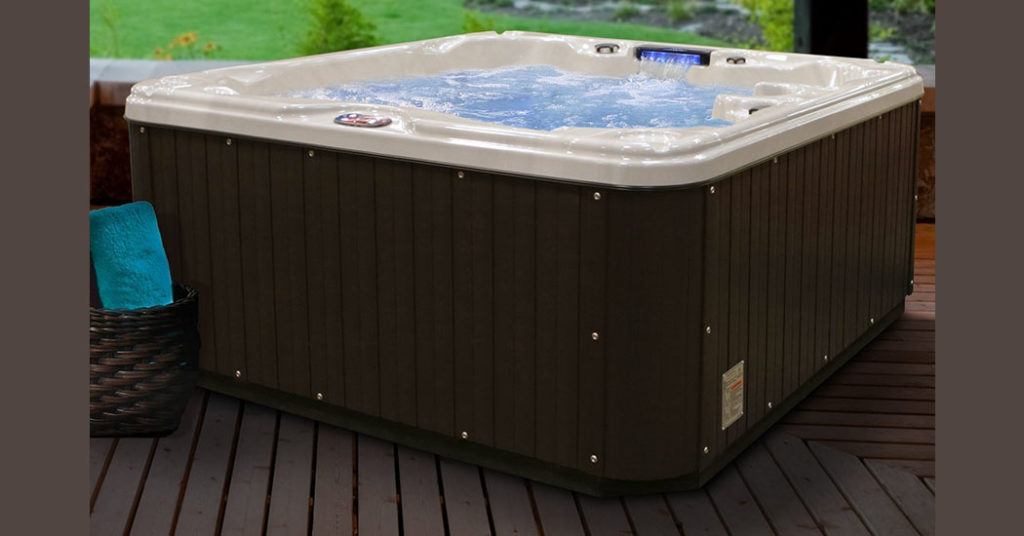
Hot tubs and spas are not just luxurious additions to your home; they’re investments in your health and well-being. One of the benefits of hot tubs and spas is that they can help you relax and reduce stress. Soaking in hot water can calm your nervous system and improve your mood. It can also relieve muscle tension, joint pain, and headaches. Some studies have shown that hot tubs and spas can also lower blood pressure and improve cardiovascular health.
Another benefit of hot tubs and spas is that they can enhance your sleep quality and well-being. Research suggests that taking a hot bath or using a hot tub before bedtime can help you fall asleep faster and sleep deeper. Hot tubs and spas can also provide a pleasant way to spend time with your family or friends, as well as a source of entertainment and fun.
Not So Beneficial
However, the luxurious soak comes with a few drawbacks. The maintenance required to keep the water clean and safe can be time-consuming and costly. Regular checks of the water’s chemical balance, along with cleaning the filters and the tub itself, are necessary to prevent algae growth and ensure the health and safety of users.
Another drawback of hot tubs and spas is the risk of heat stress and dehydration. Hot tubs and spas can raise your body temperature to dangerous levels, especially if you stay in them too long or are not used to the heat. This can cause symptoms such as dizziness, nausea, fainting, and even heatstroke.
Additionally, hot tubs and spas are significant users of electricity, which can lead to higher utility bills. The initial cost of purchase and installation can also be a barrier for some, making it important to consider the ongoing commitment alongside the benefits of ownership.
Pros and Cons of Different Pool Types
Choosing a pool can be exciting, but with so many options, it can also be overwhelming. Here’s a breakdown of the pros and cons of different pool types to help you find the perfect fit:
| Pool Type | Pros | Cons |
| In-Ground | - Customizable shapes and sizes - Durable and long-lasting - Adds value to property | - High initial cost - Time-consuming installation - Requires more maintenance |
| Above-Ground | - More affordable - Quick and easy to install - Portable | - Less durable than in-ground pools - Can be less attractive - Limited depth and size options |
| Fiberglass | - Quick installation - Smooth surface inhibits algae growth - Low maintenance | - Limited customization options - Higher initial cost than above-ground |
| Concrete | - Highly customizable - Durable and robust - Ideal for large or irregular shapes | - Requires more maintenance - Longer installation time - Higher cost of materials and upkeep |
| Vinyl Liner | - Cost-effective - Customizable shape and depth - Soft surface | - Liner needs to be replaced every 5-9 years - Vulnerable to punctures and leaks |
| Infinity | - Stunning visual effect - Enhances property value - Ideal for properties with views | - Very high cost - Complex construction requirements - Higher maintenance and operation costs |
| Lap Pools | - Ideal for exercise and training - Can fit in narrow spaces - Less water volume (easier heating and maintenance) | - Limited recreational use - Requires sufficient length for effectiveness |
| Natural Pools | - Eco-friendly, uses natural filtration - Blends with landscape - Chemical-free swimming experience | - Large space requirement - Higher initial setup cost - Requires careful ecological balance |
| Saltwater | - Gentler on skin and eyes - Lower chemical usage - Soft water feel | - Initial cost for saltwater system - Corrosion potential for pool components |
| Hot Tubs/Spas | - Therapeutic benefits - Year-round use - Requires less space | - High heating costs - Regular maintenance and cleaning - Not for swimming |
| Swim Spas | - Ideal for both exercise and relaxation - Can be used year-round - Requires less space than pools | - Limited swimming area compared to full-size pools - Can be expensive to heat and maintain |
| Rooftop Pools | - Offers spectacular views - Utilizes otherwise unused space - Can add significant value to the property | - Structural requirements can be complex and costly - Limited by space and weight constraints - May require significant maintenance |
Pool Selection: Factors to Consider for Your Home
When it comes to selecting the perfect pool for your home, there are several key factors to consider. These considerations will help ensure that your new pool not only fits your lifestyle and budget but also enhances your property. Here’s a dive into the most critical factors to weigh before making your decision:
Lifestyle and Needs:
- Who will be using the pool? Small children will have different needs than lap swimmers or those seeking relaxation.
- How often will you use the pool? Frequent use may justify a larger pool or additional features.
- What activities do you envision enjoying in the pool? Consider swimming, lounging, games, or water sports.
Budget:
- Set a realistic budget that considers not just the initial installation cost but also ongoing maintenance and potential upgrades.
- Factor in long-term costs like electricity for pumps and heaters, as well as chemicals for cleaning.
Space:
- Measure your available yard space carefully, accounting for not just the pool itself but also surrounding areas for lounging, decking, and safety features.
- Consider sun exposure throughout the day to ensure optimal enjoyment of your pool.
Pool Type:
- Above-ground pools are generally more affordable and easier to install, but offer less customization.
- In-ground pools provide more design flexibility, potentially increase home value, and create a luxurious feel.
- Specialty pools like lap pools, infinity pools, or plunge pools cater to specific needs.
Material:
- Concrete pools are highly customizable but require more maintenance.
- Fiberglass pools offer a smooth, non-porous surface and a long lifespan.
- Vinyl liner pools are a budget-friendly option but may require resurfacing over time.
Maintenance:
- Consider the time and effort you’re willing to invest in maintaining your pool.
- Research the filtration system and cleaning procedures required for different pool types.
Additional Considerations:
- Local regulations may dictate fencing requirements, safety features, or water usage restrictions.
- Permits may be needed for pool installation, so factor in processing times.
- Landscaping can enhance the aesthetics and functionality of your pool area.
By carefully considering these factors, you can choose a pool that perfectly complements your lifestyle, budget, and home. Remember, a pool is an investment, so take your time, research your options, and don’t hesitate to consult with pool professionals to ensure you make the perfect splash!
Final Thoughts
As we’ve navigated through the diverse world of pools, it’s clear that there’s a perfect pool type for every homeowner’s needs, preferences, and constraints. Whether it’s the affordability and ease of installation of above-ground pools, the durability and customization options of in-ground pools, or the therapeutic benefits of hot tubs and swim spas, each pool type offers unique advantages. The key is to match your lifestyle, budget, and available space with the pool that best meets those criteria, ensuring years of enjoyment, relaxation, and fun.
Making the final choice on the type of pool for your home comes down to a careful consideration of your long-term goals for the space, the maintenance you’re willing to undertake, and the investment you’re prepared to make. Remember, a pool is not just a place to cool off during the hot months; it’s a gathering spot for family and friends, a focal point of your backyard, and an investment in your property’s value and your quality of life. Take the time to weigh your options, consult with professionals, and choose wisely to ensure your new pool becomes a cherished addition to your home.

